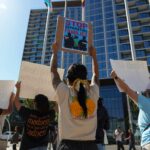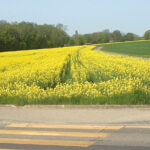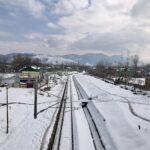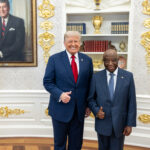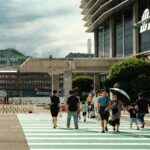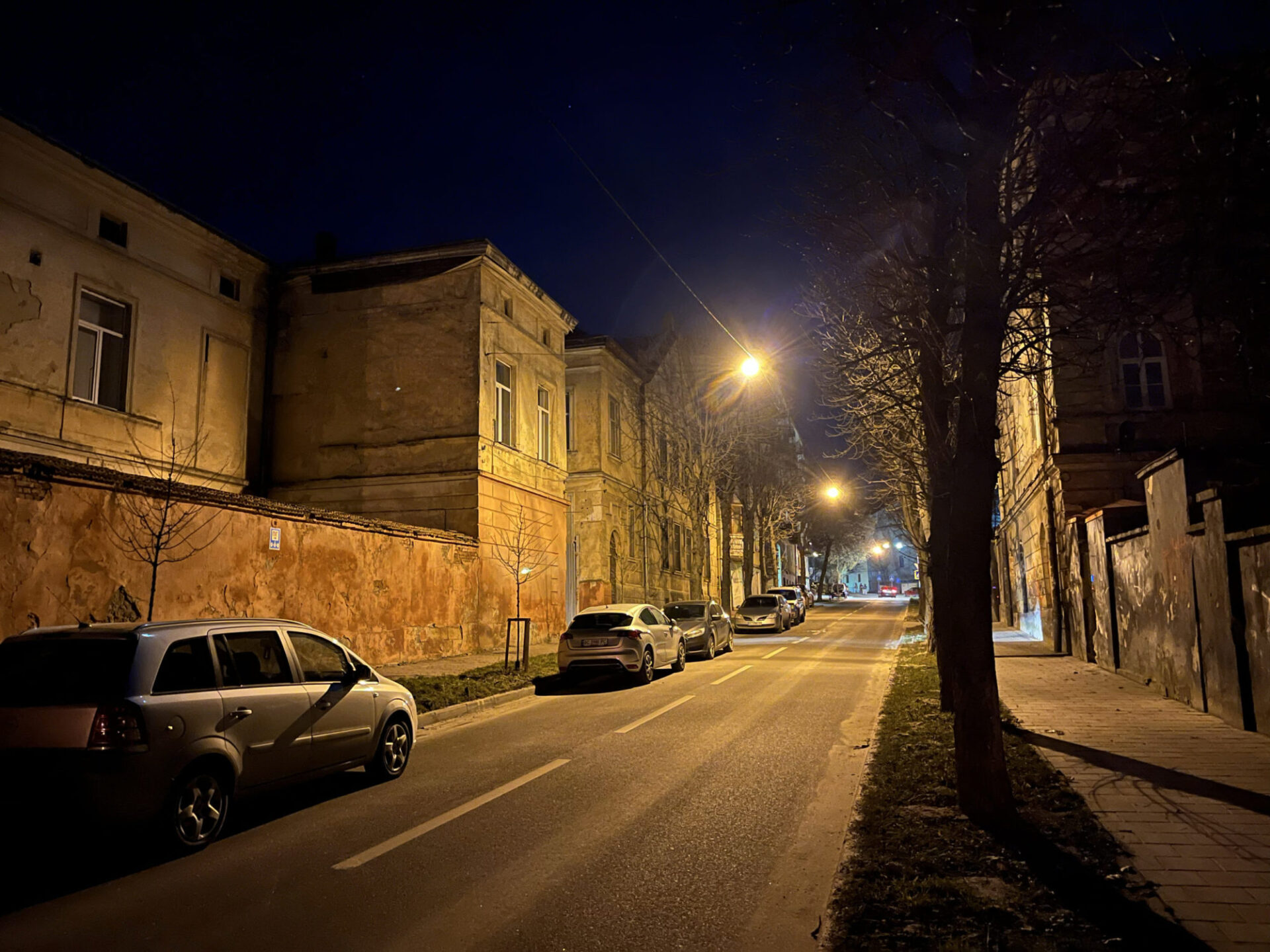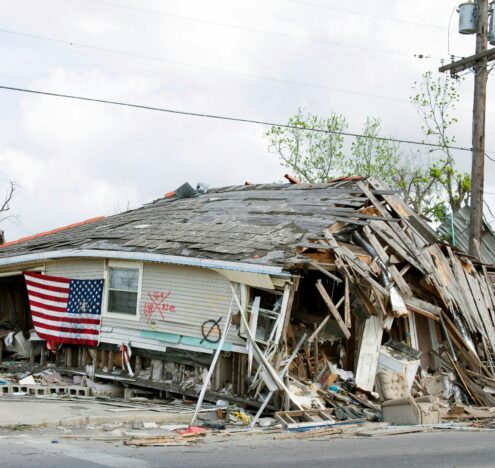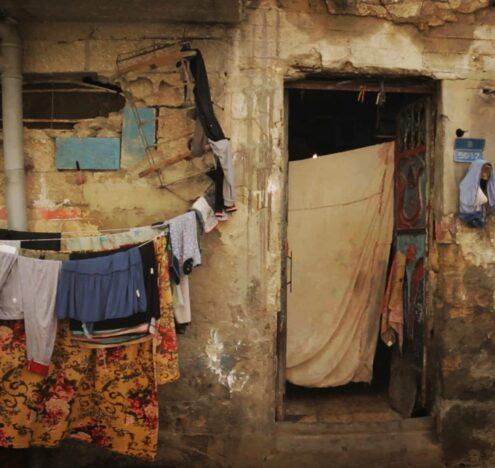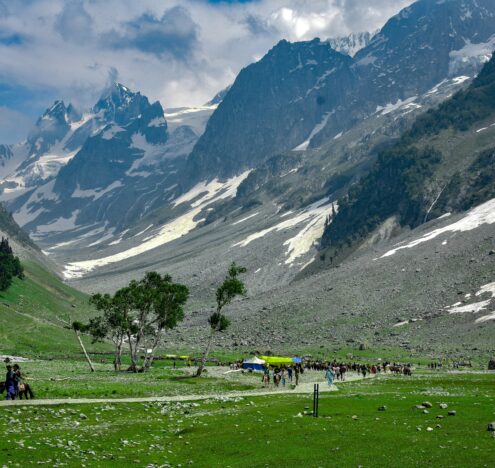“What begins as wonder ends in perplexity and thence leads back to wonder: How marvelous that men can perform courageous or just deeds even though they do not know, can give no account of, what courage and justice are.” — Hannah Arendt, “The Life of the Mind”
At the end of December 2022, I traveled to Ukraine to spend a couple weeks with my mom and celebrate old-calendar Christmas. I had not been back since the war started.
Since Feb. 24, 2022, I have followed the war closely, reading everything I could in reputable and not-so-reputable outlets, countless Twitter threads, and Telegram channels, talking daily with my mom, and staying in touch with Ukrainian colleagues and friends. I told my kids to be good, to mind their grades, and to learn to become more self-sufficient, their mother is off to war with Russia, and plunged into work, sharing what counted as my expertise on the history of Ukraine’s nuclear disarmament and Russian nuclear threats in countless interviews, podcasts, conferences, and articles, in English and Ukrainian. I responded to all requests, from CNN to a Jewish radio station in Pretoria. That, and donating to whatever drives hit my radar was the least I could do, I thought.
The last time I visited my hometown Lviv was the second week of February 2022. Then, I flew in as the United States was releasing intelligence that the full-scale Russian invasion was imminent and evacuating its diplomatic staff to attend to my mom, who was undergoing an unexpected but uncomplicated surgical procedure. Nervous expectation was in the air, but no fear. I remember asking the attendant, a portly older woman, at the pharmacy where I was buying supplies for my mom’s surgery, do you think he’ll invade? She pierced me with a look of a no-bs straight-talking aunt and said, if he’s stupid enough. Neither of us had to specify whom we meant.
Evidently, he was stupid enough, and a week after I departed Lviv, Ukrainians were awakened by bombs. Since then, I have been living and breathing this war daily, but I have not been back. It was high time.
The day before my departure on December 28, I get a text from Olia, an old friend from Lviv who now lives in Washington, DC. She has been in contact with another friend of ours from Lviv, Alina, a harpist based in London. Her brother Ilko, an architect, and a very good one, is now serving in the Ukrainian armed forces and is deployed to Bakhmut, where some of the fiercest fighting has been raging over the past few months. He needs warm clothes, it has been mild, and the boys are knee-deep in mud in the trenches, but the frosts are coming. He’s Medium Regular. Is there any way I can procure and deliver the gear?
It’s too late to order online, so the next morning, I head out to an army surplus store an hour away and ask for cold weather gear. I’m shown to a rack with seriously insulated pants, mostly US Air Force, and jacket liners. I find the Medium Regular and pause. How can I get just one? I grab everything on the rack, plus some German army mittens and whatever the store has in thermal underwear sets, about a dozen. I tell the bearded tattooed guy behind the counter that the stuff is for Ukraine, and he gives me a 10% discount. The bill comes out to $965. Meanwhile, Olia arranges for a Ukrainian diaspora family who has been fundraising for Ukraine to cover the bill. On the way home, I swing by Dick’s and get an enormous hockey bag to haul my loot.
Back home, as I’m packing, the huge bag suddenly seems puny: that’s all I got for the boys? That’s all I’m bringing from the United States, a few pants, mittens, and long johns? To the war with the Russians? To the muddy tranches of Bakhmut? I should have gotten more, so much more…
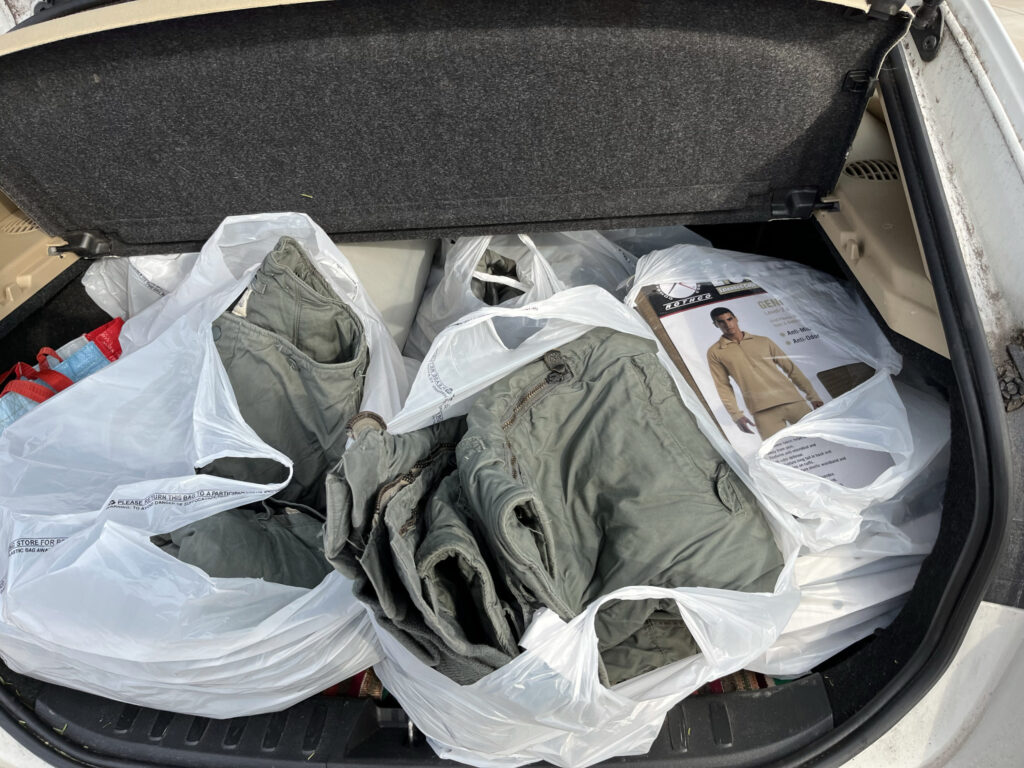
I continue packing, taking very few clothes, I have a closet-full in Lviv because it’s also home. Instead, I fill the suitcase with rechargeable lightbulbs, headlamps, flashlights, and lots of warm socks as gifts for friends and family. Electricity and heat are now intermittent.
At the Swiss Air check-in counter at Boston Logan, I mention that the big hockey bag is “humanitarian aid” for Ukraine. I say “humanitarian” out of concern, which immediately strikes me as far-fetched, that the Swiss might play the neutrality card even here and refuse to check in military gear. Instead, the young woman checks in the bag for free.
The red-eye brings me to Zurich, where I have only enough time to buy and consume an $8 coffee (that’s a quarter of a thermal underwear set, four such coffees could buy a Ukrainian soldier warmth, I think) and board a flight for Warsaw. At Chopin airport, everywhere I look, there are signs in Ukrainian offering information and help to refugees. I slowly proceed with my luggage, the huge hockey bag precariously balancing on the bigger wheeled suitcase that I push in front while pulling a smaller carry-on behind me to the exit where a friend is picking me up.
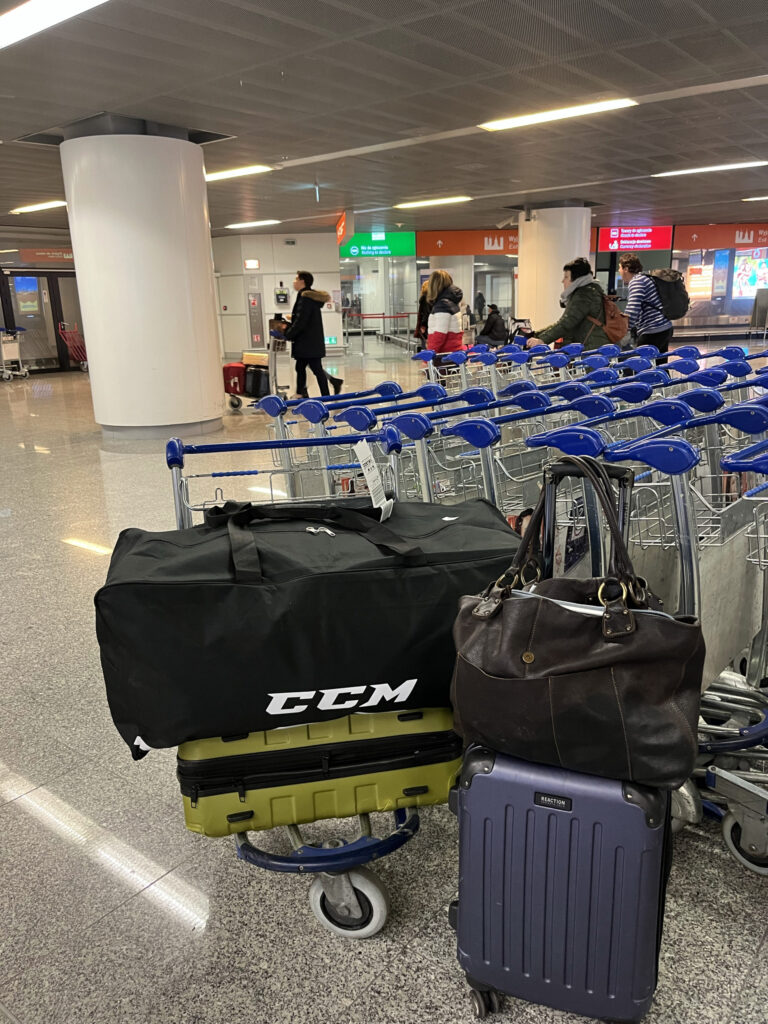
As I’m trying to locate her car, a woman stops and asks me in accented Polish if I speak Polish. I pause and prepare to say, in accented Polish, that I do, a little, but she continues, English? Ukrainian? I smile and say either one. We switch to Ukrainian, clearly her native and mine, and she asks how to get to the arrivals and whether I came from Chicago by any chance, her mother is arriving on that flight. I say I came from Boston and point her to the international arrivals.
I find my friend Myroslava, and we load my luggage in her car. Two decades ago, Myroslava arrived in the United States as a political refugee with two suitcases, two-year-old twin girls, no money, and no English. In September 2000, the body of her husband, Ukrainian oppositional journalist Georgy Gongadze, was found in the woods outside of Kyiv, beheaded.
Myroslava eventually became the chief of the Ukrainian service at Voice of America and, in February 2022, was due to move to Kyiv to head their newly established East European bureau. A few weeks before her expected move, I came to DC to help her pack and found two helmets and bullet-proof vests with PRESS in large letters on the floor in her living room. I tried them on. They were heavy. Because of the war, Voice of America moved her to Warsaw instead, from where she travels to Ukraine to cover the war, making good use of the helmet and the vest. Now she is taking me to her apartment and will drive me to the border the next day. Except, she tells me, things are brewing in Kosovo, tensions along the border with Serbia, so she can’t make the trip, she must stand by for developments in Pristina.
A Polish passport control. A Ukrainian passport control. At some invisible point between those two, stepping from one paver to the next, I cross from Poland to Ukraine. From NATO to non-NATO. From a country at peace to a country at war.
I need to find another way of getting to Ukraine. Indefatigable Olia in DC, puts me in touch with her friend John, an American who used to work for Freedom House and is now based in Warsaw. He advises me to take a train to Przemyśl, from where I can cross the border to Ukraine on foot. That’s the quickest way. There are buses, but they get held up at the border for hours. John buys me a train ticket and tells me that his friend Jan in Przemyśl, an old Solidarity activist, is standing by to help should I run into problems. The following morning, John takes me to the train station and helps load my two suitcases and the hockey bag with pants and long johns onto the train bound for Kraków. There, I catch a connection to Przemyśl, then a 10-minute taxi ride to the border crossing at Medyka.
It’s about 7 pm, dark, but not cold. There is no queue. I walk down a dimly lit paved path. The hockey bag, only 16 kg/35 lb, but bulky, refuses to balance on the suitcase, so I sling it over my shoulder, computer bag on the other, wheeling two suitcases in front of me. I catch a mental glimpse of myself, laden like a beast of burden, pressing forward in slow, stubborn locomotion.
A Polish passport control. A Ukrainian passport control. At some invisible point between those two, stepping from one paver to the next, I cross from Poland to Ukraine. From NATO to non-NATO. From a country at peace to a country at war.
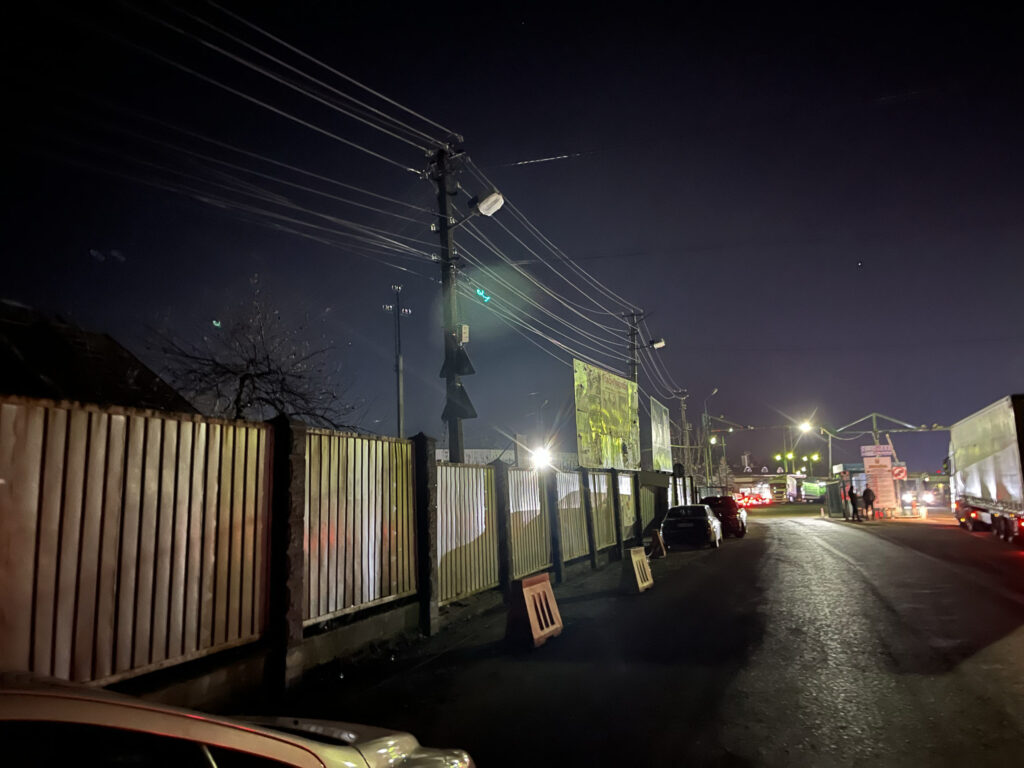
My cousin Yura meets me on the other side, and we drive an hour and a half to Lviv. John is right, this is the quickest way, if not the easiest. By about 9:30 pm we are in my mom’s kitchen, over a bowl of warm soup made with porcinis she foraged in the Carpathians last summer. Everything is as it has always been, except in place of the brightly lit TV tower, Lviv’s unmistakable marker, that normally fills our kitchen windows at night, there’s darkness. Mom pours Georgian wine, Saperavi, and we raise our glasses. To peace, I say. Everyone hesitates. To victory, says Yura, and we clink glasses. This remains the only toast to which glasses are raised for the rest of my trip.
I snap and send a kitchen selfie of us to Ulyana and Lida, two close Lviv friends. Ulyana’s husband Vlodko, a poet turned political consultant, was caught in the Russian occupation in March, in their country house outside of Irpin. She couldn’t get in touch with him for three weeks, the cell connection in the occupied territories was cut off. As a prominent Ukrainian intellectual, he would have been on the Russian extermination list. He hid in his basement for a month and survived. Ulyana calls immediately, welcomes me to Lviv, and reminds me that tomorrow is New Year’s Eve. Do I have plans? No, I do not. Would I like to join her and her friends for the celebration? With pleasure.
Ulyana and her group of friends are known for their extraordinary, themed New Year’s soirees, with skits, singing, and all-night dancing. Those have proceeded undaunted by decades that turned the lot from student activists who staged a hunger strike on Kyiv’s central square, the Maidan, in 1990 against Ukraine’s signing of Mikhail Gorbachev’s new union treaty (the treaty was not signed), into middle-aged, middle-class parents of students who came out in 2013 to protest the refusal of the then-president Viktor Yanukovych to sign the EU Association agreement and started the 2014 Revolution of Dignity (Yanukovych was ousted and the Association agreement eventually signed).
Getting a venue for the party this year was difficult, Ulyana explains. So Father Sebastian, the parish priest of the Klementi Sheptytsky church where my mom also goes, and who has gone skiing in the Carpathians for the holidays, gave them the keys to the church. We are allowed to use the reception hall in the basement, where coffee and biscuits are normally served after mess. The church was built in the 17th century, its basement with thick stone arched walls makes for a good bomb shelter, too. We are to get there before the 11 pm curfew and not to leave before the curfew is lifted at 5 am. But the stone basement is cold, so this year the group decided to make it a pajama party, everyone is to get an adult fleece onesie to pull over their clothes. Ulyana instructs me where to get one, in a second-hand shop on Zelena street.
The next morning, mom and I venture into town. Lviv seems its usual shabby-chic self, full of people roaming the cobble-stoned streets in an atmosphere of casual carnival. Except that its statues are sandbagged and stained-glass windows are boarded. The pondering Jesus that normally sits atop the early 17th-century Boim Chapel has been removed for safekeeping. Crowds include many people in military fatigues.
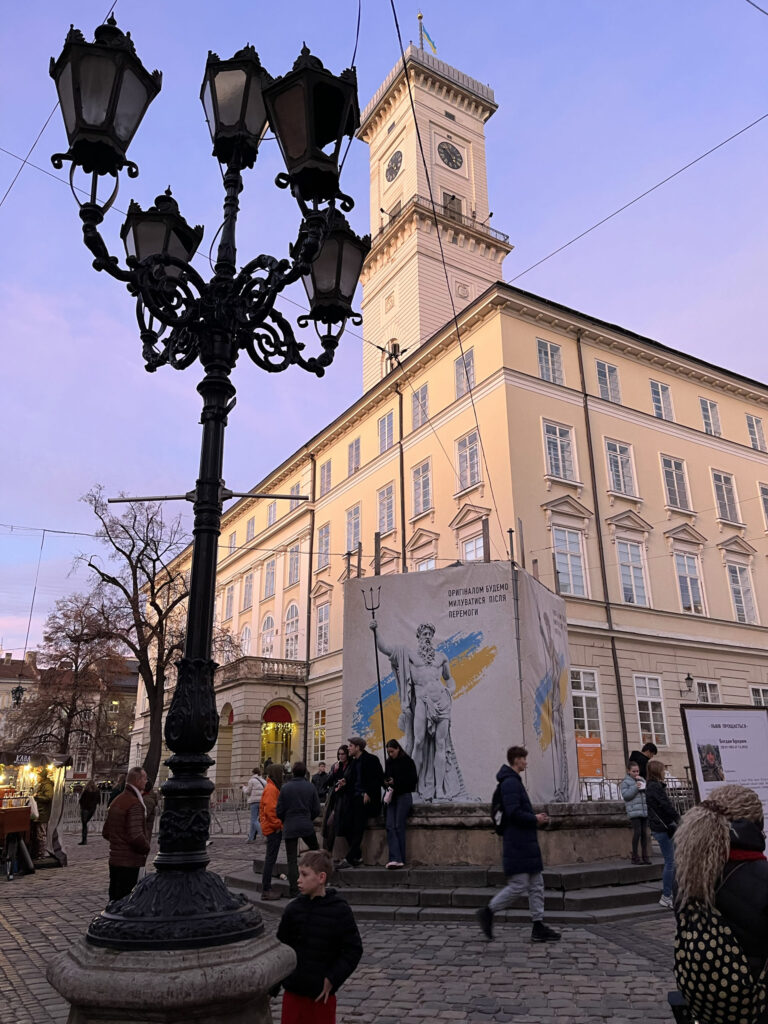
One of our errands is to procure the onesie, so we head for the thrift store on Zelena. I find a black and white tiger cat pajama complete with a hood featuring a kitty face and ears for $3. We proceed down Zelena toward the center of town, where I want to browse for presents for my kids and have my favorite buckthorn berry tea.
Suddenly, a loud wailing sound fills the air. Air raid siren, my first such experience. I stop and look around and, instinctively, upward to the sky. But no one on the street seems to take notice, and continues as if nothing out of the ordinary is happening. I take another mental picture of myself, a nuclear researcher just landed from Boston (via Zurich, Warsaw, Kraków, Przemyśl, Medyka), a bag with a cat pajama in hand, in preparation for a New Year’s celebration in a 17th-century church/bomb shelter, whose priest has gone skiing, strolling down the streets of her hometown, amid a howling air raid siren.
I check Telegram, which tells me that a bunch of Iranian drones, the Shaheds, are heading toward Kyiv and some other cities in the east, but Lviv seems to be safe this time, and since no one rushes to the bomb shelter, neither do we. Instead, we proceed to a café in the Rynok, Lviv’s renaissance central square, and order the buckthorn berry tea.
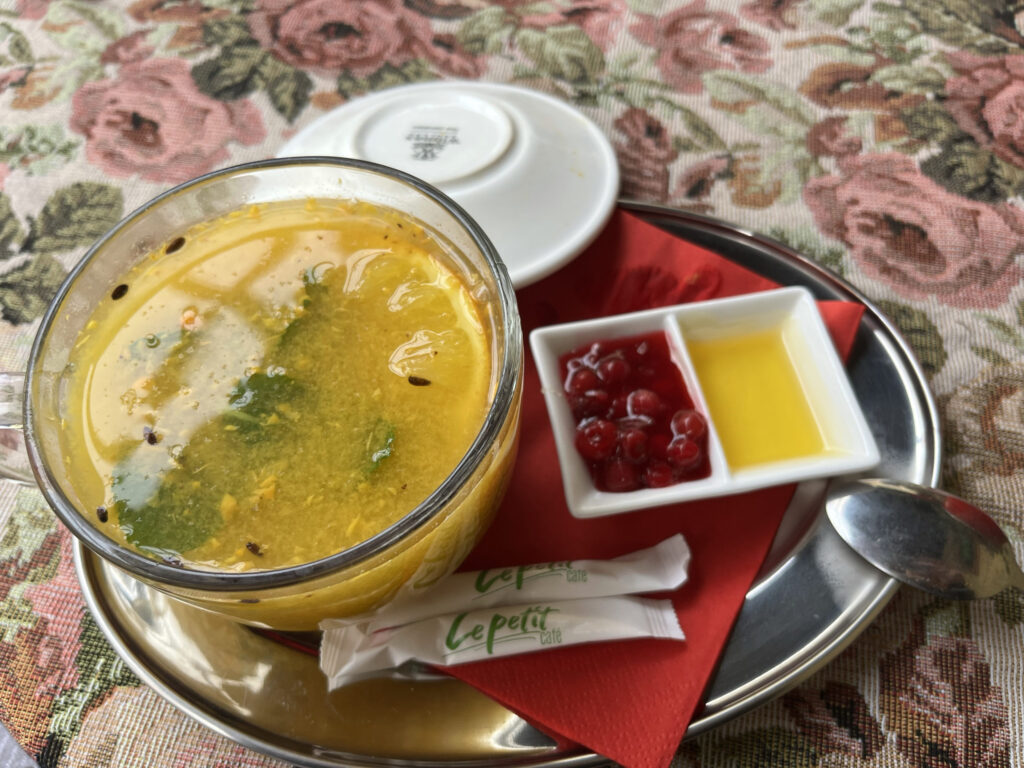
In a few minutes, we are joined by Oksana, my mom’s new friend. Oksana and her 80-year-old mother fled from Kharkiv to Lviv in March, in the first days of the war when Kharkiv came under heavy shelling. Oksana is among the few Ukrainian-speaking Kharkivites, both her parents were teachers of the Ukrainian language and literature. She comes straight from working the afternoon in the Varenychna Sotnia, a group of volunteers who make varenyky, the Ukrainian dumplings, cook them in huge pots of boiling water, coat them in oil or lard so they don’t stick, seal them in large plastic buckets, and hand them off to men who drive them straight to the front to feed the troops. Hundreds upon hundreds of varenyky. “Sotnia” means a hundred, as in Nebesna Sotnia, the Heavenly Hundred, murdered by sniper fire during the Revolution of Dignity in February 2014 on the Maidan. Sotnia is a historical military unit of the Ukrainian Cossacks.
Oksana is a craftswoman who makes traditional beaded necklaces, gerdans, and I want to order some from her. Since the war started, I resolved to smuggle Ukrainian folk elements into my business wardrobe, no doubt confounding my Western co-workers and interlocutors. While gerdans and other Ukrainian adornments are aesthetically beautiful and add a welcome splash of color to my otherwise muted attire, I have previously been cautious about wearing them at work to avoid being cast as someone with a Ukrainian nationalist bias and raising suspicions about my academic objectivity.
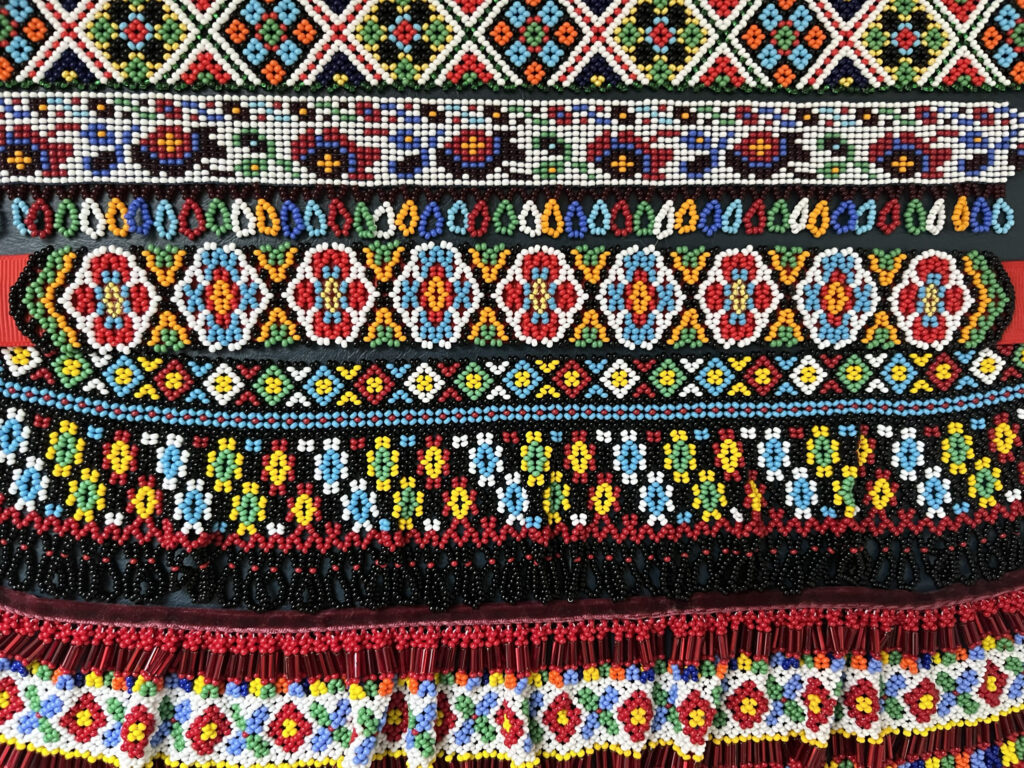
As I entertain these thoughts between sips of buckthorn berry tea, Oksana relates that while she misses Kharkiv, she is happy in Lviv. It is a relief to no longer be in a linguistic minority, not to feel the burden of suspicion that every Ukrainian word she utters is a political statement. I wonder why it should be that the mere speaking of Ukrainian and the wearing of traditional jewelry automatically bestows the presumption of guilt, the suspicion of nationalism that must be overcome with extra effort. Isn’t this what we Ukrainians have fought for in the Maidans of 1990, 2004, and 2014 and are now dying for in this war: to shed this colonial legacy, to free ourselves to be proud of our language and culture, to choose our own future, to unapologetically flaunt a gerdan?
Before heading home and onward to the New Year’s party, I meet Lida. She works at Lviv’s Institute of Culture, which supports contemporary Ukrainian artists and promotes their work abroad. It has been tough, culture has never been well funded, and much less so now, when resources are needed for war, survival, and rebuilding. She tells me that her husband Yurko, a musician, has also been having a tough time since the war started. He’s a virtuoso on the trumpet and the piano, but he can’t wield a gun. He feels useless. When we step out of the cafe, I’m struck by the darkness and the hum of generators, which I notice only now, lined along the sidewalk by the storefronts. Electricity must be out.
I also wonder whether these soldiers returning home someday will suffer from PTSD in the same way Vietnam, Afghanistan, and Iraq war veterans have.
I stop by a bookstore across from the grand Dominican cathedral where some two decades prior I got married and browse the recently published reflections on the war by Ukrainian writers and journalists. I buy a bunch. I also buy “A History of Ukraine: A Short Course” by Oleksandr Palii, a Ukrainian historian, an English-language primer on Ukrainian history compiled in an easy collection of essays and illustrations. I intend it for my kids, but it immediately strikes me that this should be required reading for all Western “Ukraine experts” that have suddenly sprung up and those in Western capitals who have the power to influence Ukraine’s fate. It strikes me that to them, Ukraine, the Ukraine I know, remains a faraway country about which they know little if anything at all. A well-intentioned senior colleague who had been involved in securing nuclear facilities and materials in Ukraine in the early 1990s and has traveled there a handful of times could still ask me in 2021 whether Ukrainian is its own language or a dialect of Russian. Where do I start answering that?
On January 3, I take an afternoon train to Kyiv. I am invited to film an interview for a documentary about Russia’s weaponization of historical narratives. The Uber driver who takes me to the train station is another transplant from Kharkiv. He has a fancy car and makes a great and successful effort to speak Ukrainian. We chat about his family’s relocation, and how he goes back every two or so months to check on their apartment in Kharkiv, just remodeled, just moved in, and then the war. He gets agitated and loses his linguistic guard, pouring out a barrage of contemptuous insults on the Russians, denying the existence of ”good” ones, in Russian, in which he’s more fluent.
The train is on time, has Wi-Fi, and even serves buckthorn berry tea. As we pull into Kyiv’s central train station just after 10 pm, I examine the city through the window, searching for signs of war. Perhaps it is darker than usual, but I can’t remember how it would have been before. Suddenly, my view is obstructed by a train we are passing. “Kyiv-Kherson” says the plaque, and my eyes tear up. A Kyiv-Kherson train, such an ordinary sight that has become so incredibly extraordinary, the very train that pulled into Kherson on November 18 after the connection had been severed by the six-month Russian occupation of that city. The Kyiv-Kherson train is now a symbol of liberation.
Kyiv is tenser than Lviv, or so it seems to me. The metro is closed and I’m having trouble securing a cab. Finally, after three failed attempts, an Uber driver takes pity on me and picks up my request. He must drop me off and make it home on the Left Bank across the river all before the 11 pm curfew, which I learn is strictly enforced in Kyiv. We rush.
I arrive at Kostiolna, a side street of the revolutionary Maidan, which is now empty and quiet. I’m staying at my friend Natasha’s place, she’s hosted me many times in the past. But the apartment is empty now. She evacuated with her son to Vienna in March and, after 10 months of separation, her husband managed to get permission to leave Ukraine and visit them. Their neighbor Yulia has the keys and lets me in. We follow the instructions for turning on electricity and water, and connecting to the Internet. The flat is revived.
Yulia asks if this is my first trip to Ukraine during the war and I affirm. We get missile strikes here, and if you have not experienced one, it is very “uncomfortable,” she tells me, the Shaheds are especially loud, they fly low and sound like mopeds right over your head, the window glass will rattle, and it will sound like they are coming straight for you. The attacks usually happen at night, she says, it’s up to you, but we take air raids seriously and go to the shelter. You have about half an hour after you hear the siren. But instead of going to our assigned shelter, we have an arrangement with a beauty salon in the basement of the next-door building, it’s more comfortable there, warm, and there’s Wi-Fi, they let us in during air raids. There are also rooms there and you can get a bit of sleep. A beauty salon opened at night with rooms seems to be a front for a brothel. Yulia gets me to download an app that sounds an air alert for Kyiv, although she says I’ll hear the siren anyway because the loudspeaker is some 300 meters away and is, well, loud.
I have a quick call with Natasha in Vienna, who gives me further instructions about sheets and towels. She has done well for herself in investment banking and is comfortable now, not the refugee one imagines. And yet she is homeless, her home is here, not in Vienna. She recalls an image conjured by Serhiy Zhadan, a contemporary Ukrainian writer from Kharkiv, of millions of Ukrainian women fleeing with their children like snails, carrying their homes on their backs to various corners of Europe. We both choke up.
I have trouble falling asleep, I anticipate a siren and the roar of Shaheds. Perversely, I find myself hoping for them so that I can experience what a missile strike is like, so that I can bear witness. Fortunately, the night is quiet.
The next morning, I make my way to a library not far from the Maidan, where the documentary film crew is waiting for me. We start at 10 am on the mark, and I go on about the Soviet dissolution, how the world was not expecting an independent Ukraine or other nations emerging from the Soviet collapse, how the perennial conflation of Russia and the Soviet Union made it easy for Russia to grab all major Soviet international statuses and claim monopoly on Soviet succession, and how nobody was willing or able at the time to contest it, except for Ukraine on the nuclear inheritance issue, modest though this contestation was.
I catch myself talking a lot, in a semi-structured stream of consciousness, the producer does not interrupt, which proves lucky. At 10:35 am, the familiar wailing of the air raid siren fills the room, first on my phone and then outside. Then all falls silent. The producer hesitates, but her crew is determined: shelter. The camera and lights are packed, the mic is detached from my lapel, and we are on the way to the shelter. Telegram says two Russian MiG-31Ks, carriers of Kinzhal dual-capable hypersonic cruise missiles, have taken off from an airfield in Belarus. It could be nothing. Russians do this from time to time, scramble aircraft just to trigger an air alert in Ukraine and bring the country to a standstill. But it could be an attack.
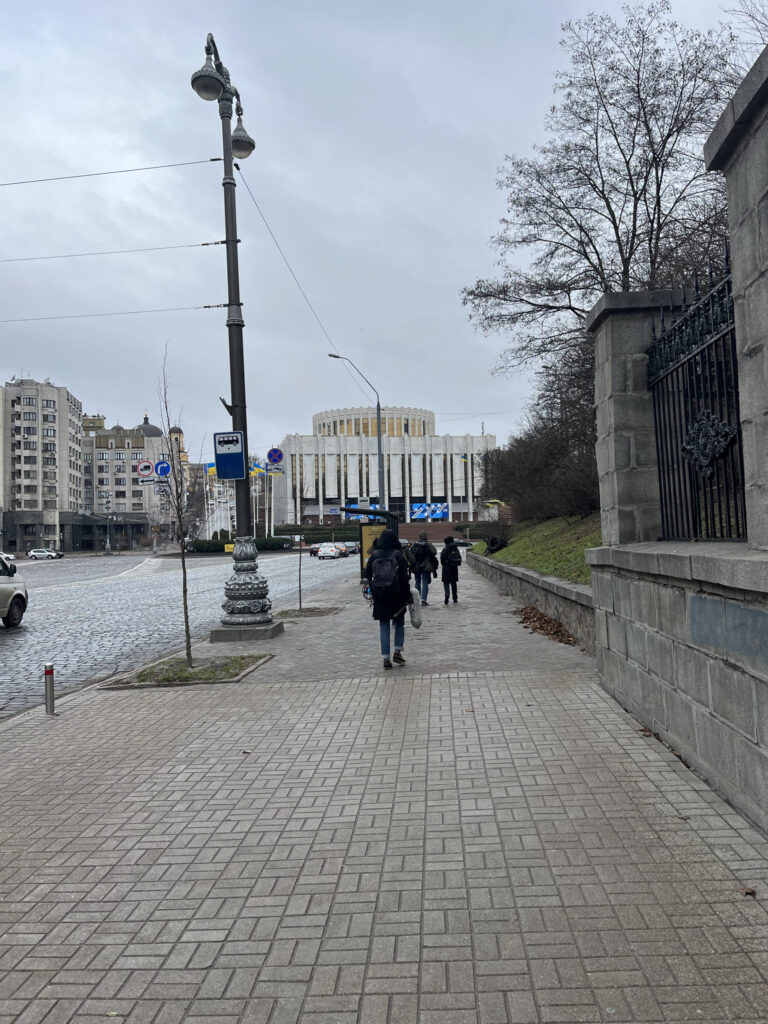
The documentary crew heads for the Ukrainian House, a Soviet-era monstrosity that has a comfortable shelter, I’m told. But I decide to head toward the apartment. On the way, I notice people filing into a basement café and realize that I haven’t had a coffee or breakfast yet. I go in, and most of the patrons are scrolling their screens and sitting out the air alert. I order a flat white and a croissant, pull out my laptop, connect to the Wi-Fi, and pick up where I left off on reviewing a colleague’s book manuscript on South Africa’s nuclear history. I feel strangely empowered in my defiance: the Russians will not bring my life to a standstill.
After two hours and two more flat whites, the app on my phone announces in a Cronkite-like voice: “The air alert is over. May the force be with you!” Another mental image imprints itself: an expert interviewed for a documentary, lucky to have blurted out a monologue from which some useful cuts could be made before the filming is interrupted by a siren, now waiting out an air raid, sipping coffee, munching croissants, and getting some work done in a basement café, a fitting alternative to a beauty salon/brothel/shelter option, to be set free by a snazzy English-speaking app with a Hollywood reference.
I order a flat white and a croissant, pull out my laptop, connect to the Wi-Fi, and pick up where I left off on reviewing a colleague’s book manuscript on South Africa’s nuclear history. I feel strangely empowered in my defiance: the Russians will not bring my life to a standstill.
I go on to meet Olha, a journalism student who has interviewed me before over Zoom for an article about Ukraine’s nuclear disarmament. When she found out I was in Ukraine, she wanted to meet in person, to “devirtualize” our acquaintance, as she put it. She was making her way to Kyiv from Boryspil, about an hour away, where her school got demolished by a Russian missile in March, when the siren went off, and she spent two hours hiding in the subterranean metro tunnel. We have a coffee, and she tells me about getting a lot of hate commentary about her piece on Ukraine’s nuclear disarmament. She has been called a paid stooge of the United States and/or Russia, that those two denuclearized Ukraine in exchange for empty promises, and when Russia snatched Crimea and moved into the Donbas, the West, “gravely concerned,” did nothing, not even the Javelins, not even proper sanctions against Russia…
The sentiment is all too familiar to me from numerous casual conversations in Ukraine. I am wondering about my book, a history of Ukraine’s nuclear disarmament, whether it will get translated into Ukrainian, and how it will be received. The past tends to slip away just when we historians think we’ve pinned it down.
I return to Lviv on an early morning train the next day. It’s January 5, and the next couple of days are busy: two live TV appearances, a photo session to finally get a few professional headshots, more meetings with friends, and the preparation for the traditional Christmas Eve dinner, always a labor-intensive endeavor. Oksana, her mother, Yura the cousin, and another friend join us. We don’t have the required twelve dishes, for the twelve apostles, but we have the essentials: Kutya, the wheat berry, walnut, raisin, honey, and poppy seed serial prepared only at Christmas; borsch with vushka, “little ears,” dumplings filled with porcinis; and potato- and sourcrout-filled varenyky. We sing carols, which I never remember learning, seems like I was born knowing them. Our Kharkiv guests don’t know any. You didn’t have the communists the way we did, Oksana says.
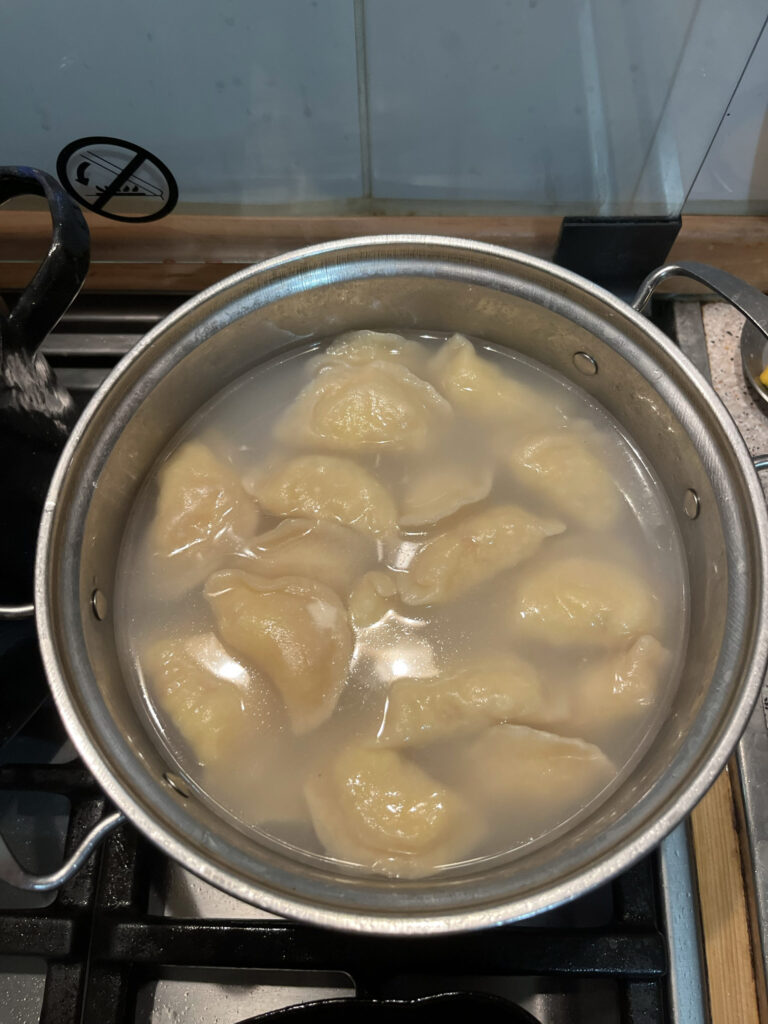
On Christmas Day, January 7, I wake up to find in my phone a message from Alina in London that includes a video from her brother Ilko somewhere near Bakhmut. Earlier in the week, his girlfriend Iryna picked up the huge hockey bag I dragged from Boston and sent it via Nova Poshta, a Ukrainian delivery service that perseveres despite the war, to the front line. Iryna said she hasn’t heard from Ilko in a couple of days because his unit has gone to “position 0,” the no-man’s-land between the Ukrainian and Russian fortified lines where much of the fighting and dying takes place. Since then, I have been trying not to think of the hockey bag because when I did, I wondered if Ilko would still be alive by the time the bag arrived. And now I see him, he is very much alive and handsome in his fatigues, rifle across his chest, pointed down, talking into the camera.
In between the fighting, he finds the time to record a thank you note. He mentions me and my border crossing adventure, acknowledges the benefactors who covered the expense, and says that now he and his comrades will stay warm in the cold trenches and that they promise not to let us down, the victory is ours. They promise not to let us down?! They, who are knee-deep in trench mud, a Russian bullet, mine, grenade, missile away from death, promise not to let us, who are sipping flat whites and getting shot by cameras, down?! How is this logical construction even possible, I wonder?
I also wonder whether these soldiers returning home someday will suffer from PTSD in the same way Vietnam, Afghanistan, and Iraq war veterans have. Or will the fact that the whole Ukrainian society, its every member, regardless of age, region, and wealth, has been affected by the war and is engaged in the resistance of some kind, whether that will make the return of these soldiers home different. Whether the people who make varenyky by the hundreds, donate for long johns and generators, open doors to refugees, repair damaged electricity lines, or just work to keep the Ukrainian economy and culture alive despite missile strikes and power outages, and those mud- and blood-covered soldiers at Bakhmut, Soledar, and Kreminna, are connected by invisible bonds of solidarity and common purpose, the bonds that will persist long after the war is over.
My Christmas day proceeds with these thoughts and the usual festivities. A mess at the Klementi church, about which we paraded in our pajama onesies just a week earlier, served by Father Sebastian, who just returned from skiing, and concluding with a Vertep, a street-theatrical reenactment of the nativity story peppered with traditional carols. Then Ulyana, Lida, Yurko, and Yura the cousin come to our place, and we eat and drink and carol around the table from the bottom of our hearts.
We record one carol and send it to Olia in DC, Alina in London, and a handful of other friends scattered around the world. Then Ulyana and I attend an exhibition about interwar Lviv, its fascinating hybrid Polish-Jewish-Ukrainian culture, and the fate of a Lviv artist collective from that period, and how its members, Poles, Ukrainians, and Jews fought, died, and survived in the last war that ravaged this land. The stories would seem unreal and made up, if it weren’t for the experiences on this trip, always finding myself in some liminal space, where the mundane and the extraordinary, the sacred and the profane, peace and war, life and death are melded in one surreal tragicomic soup.
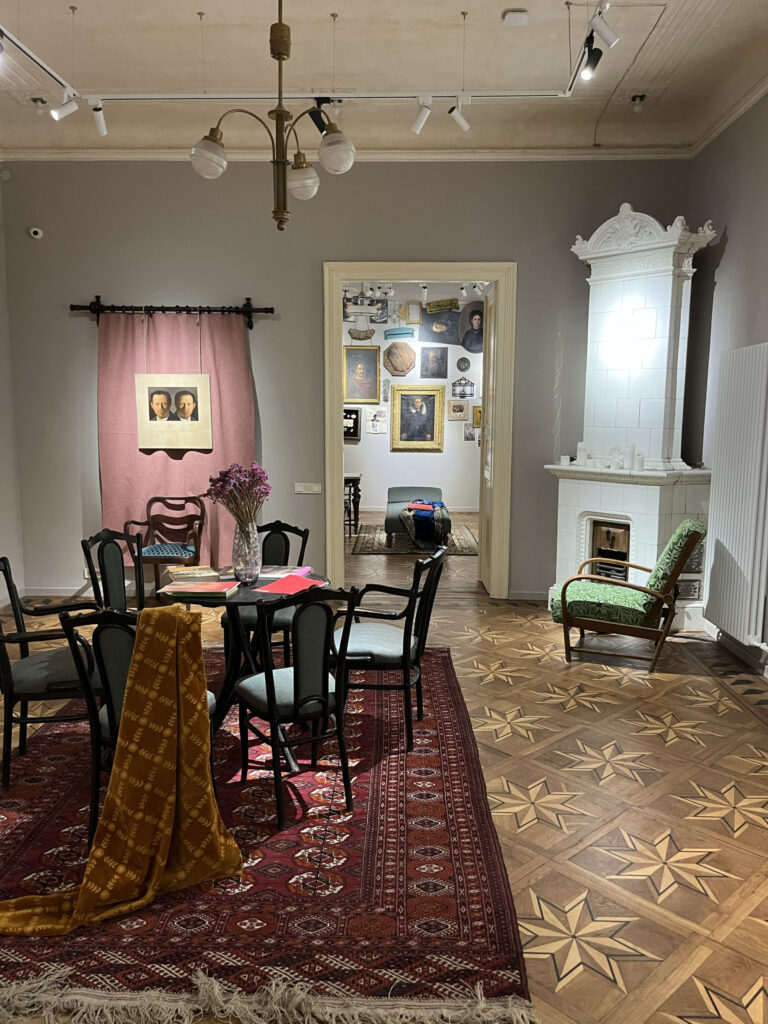
As I write these lines, raw in their pathos and style, the death toll from a Russian missile strike on a residential tower in Dnipro reaches 25, with dozens more injured and missing, many still under the rubble. Facebook also reminds me that it’s the birthday of Taras Stelmakh, my classmate and a military medic, who was killed in the Donbas in 2014, in the First Campaign as the military calls it, and whose story I wrote into the prologue of my book, not realizing at the time its full significance. His death was indeed a prologue to a move vicious, bloodier Second Campaign, the war of extermination and survival.
There is pain for the loss of Taras, those in Dnipro, those in Bucha, Mariupol, and Izyum, and those who will have fallen in Bakhmut and elsewhere along the 2,500 km front of this absurd Russian war before I finish this essay. But in this concoction of pain, pride, anger, determination, resourcefulness, sarcasm, and sorrow, amid the wailing of sirens, the roar of Shaheds, and the hum of generators there is a notable, palpable absence: the absence of fear. It is intoxicating, even addictive.
I did not want to leave. I can’t wait to go back.
Mariana Budjeryn is a senior research associate at Harvard Kennedy School’s Belfer Center, Project on Managing the Atom, and the author of “Inheriting the Bomb: The Collapse of the USSR and the Nuclear Disarmament of Ukraine” (Johns Hopkins University Press, 2023).
All photographs were taken by the author during her visit.




